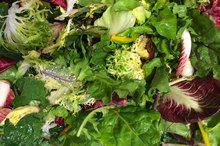What does fact checked mean?
At Healthfully, we strive to deliver objective content that is accurate and up-to-date. Our team periodically reviews articles in order to ensure content quality. The sources cited below consist of evidence from peer-reviewed journals, prominent medical organizations, academic associations, and government data.
The information contained on this site is for informational purposes only, and should not be used as a substitute for the advice of a professional health care provider. Please check with the appropriate physician regarding health questions and concerns. Although we strive to deliver accurate and up-to-date information, no guarantee to that effect is made.
Potassium in Kale
Kale is a slightly tough but highly nutritious member of the brassica family. It's rich in vitamin C, vitamin A, beta carotene, calcium and folates. It also makes an excellent source of dietary potassium, with one of the highest potassium concentrations of any vegetable, particularly in its raw form. Potassium is a crucial electrolyte in the body, meaning it helps to transmit impulses through nerves and muscles. It also plays a role in healthy blood pressure.
Kale Potassium
A 100 gram serving of boiled, drained and lightly salted kale contains 228 milligrams of potassium, according to the USDA National Nutrient Database 1. The same amount of raw kale contains 447 milligrams per 100 grams. Much of the potassium is lost to the cooking water during the boiling process. Unfortunately, raw kale often tastes tough and chewy. Steaming or stir-frying kale helps to retain more potassium in the leaves and softens the leaf for eating.
- A 100 gram serving of boiled, drained and lightly salted kale contains 228 milligrams of potassium, according to the USDA National Nutrient Database 1.
- Steaming or stir-frying kale helps to retain more potassium in the leaves and softens the leaf for eating.
Daily Value
How Much Potassium Is in Bitter Gourd?
Learn More
The average healthy adult should aim for 4,700 milligrams, or 4.7 grams, of potassium from food each day, according to Colorado State University Extension. So, a small serving of kale provides between 5 and 10 percent of your daily potassium needs. As a comparison, 100 grams of roasted chicken breast with the skin left on contains 245 milligrams of potassium, significantly less than raw kale, though slightly more than boiled kale.
- The average healthy adult should aim for 4,700 milligrams, or 4.7 grams, of potassium from food each day, according to Colorado State University Extension.
- As a comparison, 100 grams of roasted chicken breast with the skin left on contains 245 milligrams of potassium, significantly less than raw kale, though slightly more than boiled kale.
Potassium Benefits
Potassium is a crucial mineral for proper function of the nervous system, and it also appears to help to maintain a stable blood pressure. In fact, if your diet is high in potassium, you may be helping to lower your blood pressure, according to an analysis by Jane Higdon, Ph.D., at the Linus Pauling Institute 2. This may in part be because of potassium's role in stabilizing water levels in the body. The more potassium you consume, the more sodium it triggers for excretion through urine. Sodium is directly connected with increased blood pressure and hypertension.
- Potassium is a crucial mineral for proper function of the nervous system, and it also appears to help to maintain a stable blood pressure.
- In fact, if your diet is high in potassium, you may be helping to lower your blood pressure, according to an analysis by Jane Higdon, Ph.D., at the Linus Pauling Institute 2.
Kale
Does Potassium Aid in Weight Loss?
Learn More
Kale's potassium content isn't its only nutritional benefit. Though it consists of more than 90 percent water and contains only 36 calories per cup, it is rich in essential nutrients. As the Harvard Medical School Center for Health and The Global Environment points out, it can provide six times more than your daily requirements for vitamin K, twice your beta-carotene needs and an entire day's worth of vitamin C in one cup.
Related Articles
References
- USDA National Nutrient Database
- Linus Pauling Institute; Potassium; Jane Higdon, Ph.D.; February 2004
- Potassium. Office of Dietary Supplements. National Institutes of Health
- Lambert H, Frassetto L, Moore JB, et al. The effect of supplementation with alkaline potassium salts on bone metabolism: a meta-analysis. Osteoporos Int. 2015;26(4):1311-8. doi:+10.1007/s00198-014-3006-9
- Chatterjee R, Slentz C, Davenport CA, et al. Effects of potassium supplements on glucose metabolism in African Americans with prediabetes: a pilot trial. Am J Clin Nutr. 2017;106(6):1431-1438. doi:10.3945/ajcn.117.161570
- Potassium. Fact Sheet for Consumers. Office of Dietary Supplements. National Institutes of Health
- Health Claim Notification for Potassium Containing Foods. US Food and Drug Administration
- Aburto NJ, Hanson S, Gutierrez H, Hooper L, Elliott P, Cappuccio FP. Effect of increased potassium intake on cardiovascular risk factors and disease: systematic review and meta-analyses. BMJ 2013;346:f1378.
- Academy of Nutrition and Dietetics. What Is Potassium?
- ConsumerLab.com. Potassium Supplements Review.
- Curhan GC, Willett WC, Rimm EB, Stampfer MJ. A prospective study of dietary calcium and other nutrients and the risk of symptomatic kidney stones. N Engl J Med 1993;328:833-8.
- Curhan GC, Willett WC, Speizer FE, Spiegelman D, Stampfer MJ. Comparison of dietary calcium with supplemental calcium and other nutrients as factors affecting the risk for kidney stones in women. Ann Intern Med 1997;126:497-504.
- D’Elia L, Barba G, Cappuccio FP, Strazzullo P. Potassium intake, stroke, and cardiovascular disease a meta-analysis of prospective studies. J Am Coll Cardiol 2011;57:1210-9.
- O’Neil C, Keast D, Fulgoni V, and Nicklas T. Food sources of energy and nutrients among adults in the US: NHANES 2003-2006. Nutrients. 2012;4:2097-120. DOI: 10.3390/nu4122097.
- Stone M, Martyn L, and Weaver C. Potassium intake, bioavailability, hypertension, and glucose control. Nutrients. 2016;8: E444. DOI: 10.3390/nu8070444.
- U.S. Food and Drug Administration. Health Claim Notification for Potassium Containing Foods.
- Weaver CM. Potassium and health. Adv Nutr 2013;4:368S-77S.
- Yong Sun, et al. Dietary potassium regulates vascular calcification and arterial stiffness. JCI Insight. 2017;2(19):e94920.
Writer Bio
Based near London, U.K., Peter Mitchell has been a journalist and copywriter for over eight years. Credits include stories for "The Guardian" and the BBC. Mitchell is an experienced player and coach for basketball and soccer teams, and has written articles on nutrition, health and fitness. He has a First Class Bachelor of Arts (Hons.) from Bristol University.









